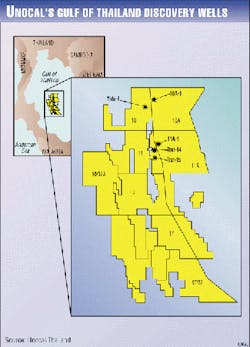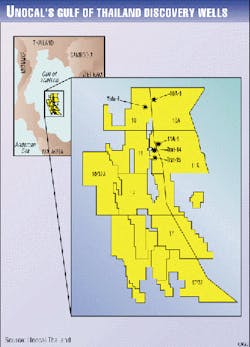Unocal updates Gulf of Thailand drilling
Unocal Corp.'s latest drilling results have confirmed the long-standing conviction that an area in the Gulf of Thailand once disputed by Thailand, Viet Nam, and Cambodia is hydrocarbon-prone.
Subsidiary Unocal Thailand Ltd. has discovered two reservoirs on Blocks 10A and 11A, which it and its partners won in 1997, after a boundary resolution was reached between Thailand and its neighboring countries.
Unocal Thailand Pres. Randy Howard said the discoveries are significant for two reasons. First, they provide further evidence that the Gulf of Thailand contains additional oil and gas resources. And second, they include a potentially commercial oil discovery in the gulf, which is considered gas-prone.
This is Unocal's first major oil discovery in the area. The firm has been extensively engaged in exploring and developing petroleum resources in Thailand-mostly gas in the Thai gulf-for over 30 years.
Drilling update
The discoveries came as Unocal Thailand drilled its first exploration wells on Blocks 10A and 11A in the prolific Pattani basin.
On Block 10A, the 10A-1 discovery well-drilled a few kilometers south of Tantawan field, an oil and gas field operated by Chevron Corp.-reached 3,743 m TD in July and encountered 41 m of gas and condensate pay. On test, the well flowed 14.8 MMcfd of gas and 250 b/d of condensate through a 52/64-in. choke.
A follow-up well, Yala-3, was drilled on adjacent Block 10 in August to a depth of 3,472 m; it cut 148 m of oil and gas pay. Two tests were conducted on the well; one flowed at a rate of 3,152 b/d of oil, and the second test flowed at a rate of more than 18 MMcfd of gas and 485 b/d of condensate.
"The Yala-3 well is significant because it tested oil in a region where we have typically found natural gas and condensate," Howard said. "We plan to conduct further delineation drilling. If the resource is commercial, we will look at tying into existing oil pipelines to bring this oil and gas to market."
On Block 11A, the 11A-1 discovery well was the first well drilled in the previously unexplored North Trat graben trend, 20 km north of Unocal's Trat gas-condensate field, which began producing 70 MMcfd of gas and 2,100 b/d of condensate in early September. The 11A-1 well was drilled in July to 3,340 m and cut 55 m of gas pay in two zones. It flowed at a combined rate of 18 MMcfd of gas and 675 b/d of condensate through a 56/64-in. choke.
Two more successful wells were drilled on adjacent Block 11 to confirm the potential of the new trend. Trat-14, drilled in August to a depth of 3,524 m, encountered 29 m of gas pay. And Trat-15, drilled in September to 3,469 m, cut 32 m of gas pay. No tests were performed on the Trat wells.
Blocks 10A and 11A are operated by Unocal Thailand, which has a 60% working interest; Mitsui Oil Exploration Co. (MOECO) holds the remaining 40%.
Blocks 10 and 11 are held under separate concessions, in which Unocal Thailand has a 71.25% stake, MOECO 23.75%, and Thai state firm PTT Exploration & Production PLC 5%.
Southeast Asia markets
Howard noted that, while the present market for gas in Thailand may be limited, the additional gas resources developed through the exploration program will add to the inventory of domestic energy supplies available as the Thai economy recovers from the crisis that erupted in mid-1997 (OGJ, Sept. 27, 1999, p. 41).
Gross production from the 13 fields that Unocal Thailand operates in the Gulf of Thailand is currently averaging more than 1 bcfd of natural gas and 38,000 b/d of condensate. Unocal is the largest natural gas producer in the kingdom.
On the other side of the gulf, Unocal has been exploring on three tracts. Last year, the US energy firm acquired Viet Nam's Block A, covering more than 2 million acres in the Gulf of Thailand. The block is just north of Block B, where Unocal made a significant gas discovery, Kim Long, in December 1997.
In 1998, the company also acquired an interest in Block 52/97, on the Viet Nam side of what is called the Thai- Viet Nam overlapping area.
"Combined, this Viet Nam acreage is a huge area with outstanding resource potential," said Unocal Corp. CEO Roger Beach in a recent presentation. The acreage adjoins Unocal Thailand's productive area and Viet Nam, which has what is considered a high-potential, emerging power market. Unocal will closely limit its capital here, however, while that market is developed, said Beach.

